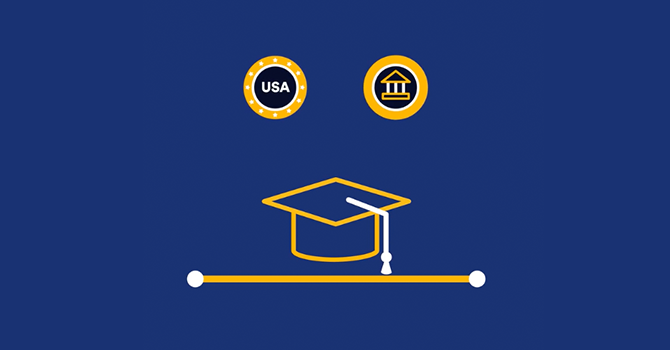If you’re a nurse with student loan debt, you’re certainly not alone. Nurses, especially those with advanced degrees, have some of the highest rates of student loan debt compared to other professions. Some of the percentages of student loan debt among advanced practitioners include:
- 74% of Nurse Practitioners
- 61% of Clinical Nurse Specialists
- 75% of Certified Nurse Midwives
- 92% of Certified Nurse Anesthetists
The average student loan debt for different levels of nursing education include:
- Associate Degree Nursing (ADN) – $19,928
- Bachelor of Science in Nursing (BSN) – $23,711
- Master of Science in Nursing (MSN) – $47,321
We’ll compare ways to pay off nursing school debt to help you determine the right strategies for you based on your current goals and other financial considerations.
Nursing School Debt Repayment Strategies
Nurses can potentially pay back student loan debt faster by taking advantage of a number of strategies including:
- Student loan forgiveness programs at the state and federal level including Public Service Loan Forgiveness(PSLF), Nurse Corp Loan Repayment Program (NCLRP) and Indian Health Services Loan Repayment Program (IHS)
- Assistance programs offered through your employer as part of your employment benefits
- Income-driven repayment plans (IDR) such as Income-Based Repayment (IBR), Pay As You Earn (PAYE), Revised Pay As You Earn (REPAYE), Income-Contingent Repayment (ICR)
- Automated Payments – Some lenders will offer discounts if you automate your monthly payments
- Making extra payments on a recurring basis or in lump sum
- Refinancing if you have higher interest graduate school loans, are not on an income-driven plan, and/or don’t qualify for loan forgiveness. Learn more about student loan refinancing options through Laurel Road here.
- Consolidating multiple loans into one single loan with just one monthly bill.
Compare Nursing School Repayment Options
Use this chart to compare how different strategies such as making extra payments, changing repayment plans, automating student loan payments, student loan forgiveness programs, and refinancing could help your repayment goals and the potential impact on how you pay off nursing school debt.
 Pay more to the minimum Pay more to the minimum |
How much impact |
High Potential.
When applying your payments towards the principal, you can potentially pay off your loan quicker while avoiding interest.
|
How it helps | Making more than just minimum monthly payments pays down your debt’s principal, which shortens the time to repay while avoiding additional interest charges. | How to do it | Adjusting your budget to cut expenses, finding a side gig, or taking on overtime hours can help free up funds to pay more than the minimum. |
|---|---|---|---|---|---|---|
 Student loan refinancing Student loan refinancing |
How much impact |
High Potential.
Lowering your interest rate can help save on monthly payments and/or reduce the length of your loan’s term, helping you save over the life of the loan.
|
How it helps | A refinanced student loan will restructure your debt, often to earn a lower interest rate or to adjust the terms to better match your budget. | How to do it | Learn more about your options for student loan refinancing with Laurel Road. |
 Student loan forgiveness Student loan forgiveness |
How much impact |
Significant.
Forgiveness of loans can eliminate remaining debt, along with any interest, after meeting all the program requirements.
|
How it helps | Nurses working in public sectors, non-profits, or rural areas may qualify for forgiveness for a portion of their existing loans. | How to do it | Review our Student Loan Forgiveness guide, or studentaid.gov page to see if you may qualify. |
 Consider income-driven repayment plans Consider income-driven repayment plans |
How much impact |
Moderate.
Switching to an income-driven repayment plan (IDR) reduces your monthly payment amount for federal loans according to your income.
|
How it helps | The payment amount is typically calculated as a percentage of your discretionary income and is updated annually to account for income changes. Note, not all borrowers qualify for all IDR plans. | How to do it | For federal student loans, contact your servicer to apply for income-driven repayment plans, or visit www.studentaid.gov/idr to learn more. |
 Automate loan payments Automate loan payments |
How much impact |
Minimal.
Discounts are often a small percentage of the total debt.
|
How it helps | Some lenders will offer discounts if you automate your monthly payments. | How to do it | Ask your lender if they offer discounts for automated payments and connect to your payment accounts to see if this can help you save. |
SOURCES
https://www.aacnnursing.org/Portals/42/Policy/PDF/Debt_Report.pdf
https://www.nerdwallet.com/article/loans/student-loans/average-nursing-student-debt
https://studentaid.gov/help-center/answers/article/can-i-pay-more-than-required-monthly-payment-on-loan
https://nursejournal.org/resources/student-loan-forgiveness-for-nurses/
https://nurse.org/education/nursing-student-loan-refinancing-guide/
https://studentaid.gov/manage-loans/repayment/plans/income-driven
https://www.forbes.com/advisor/student-loans/student-loan-autopay/
https://studentaid.gov/loan-simulator/




